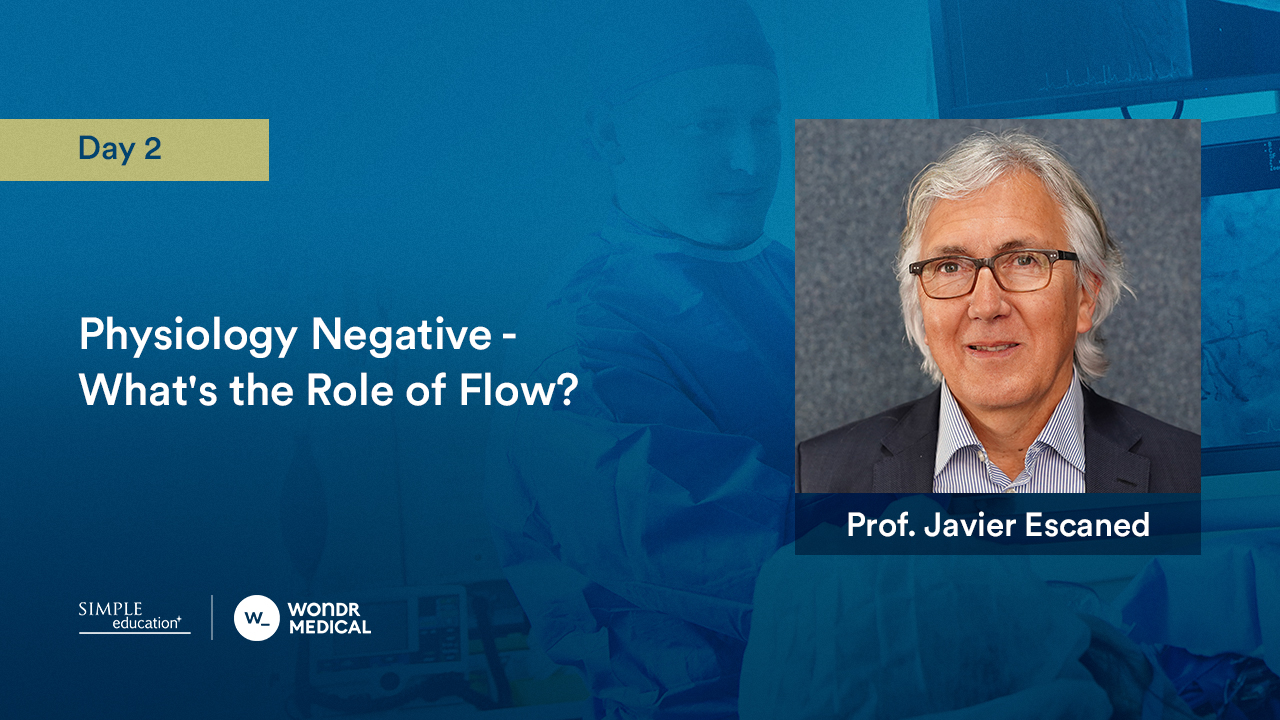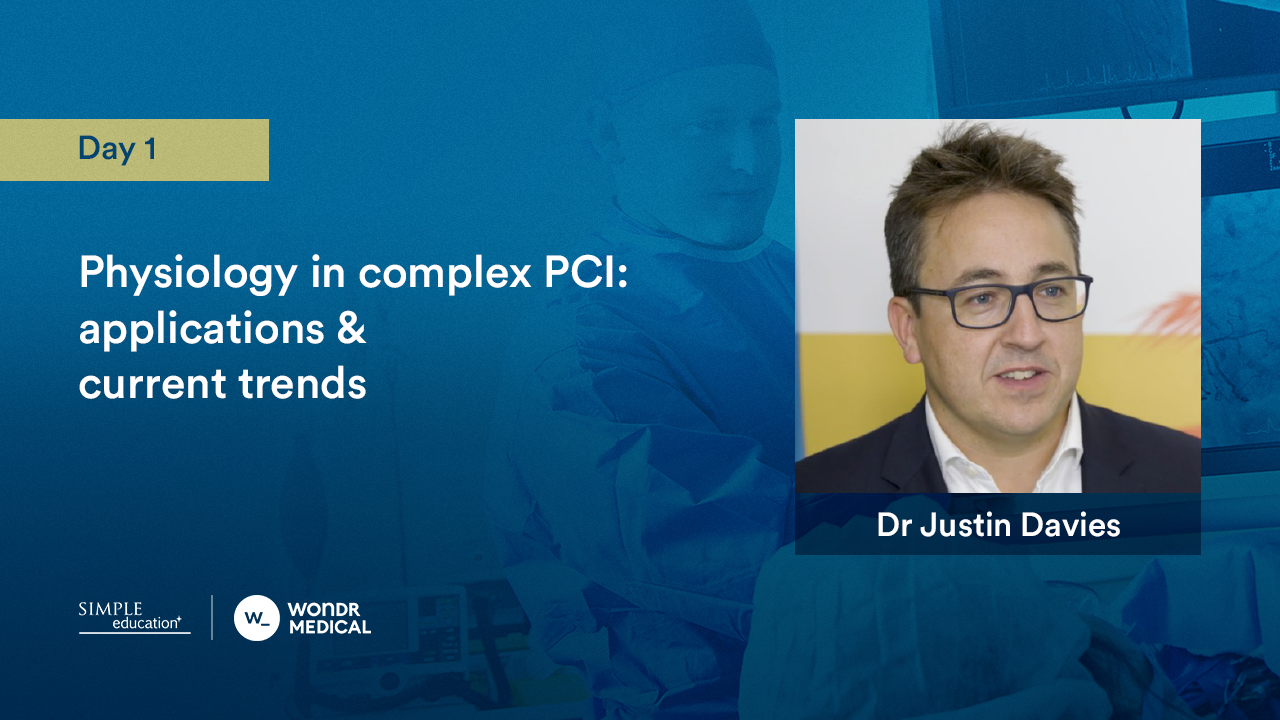- Co-registration
- Percutaneous Coronary Interventions (PCI)
- Coronary Physiology
- Intracoronary Imaging
- Coronary Physiology and Imaging
Evolution of Artificial Intelligence in Coronary Physiology - What Are the Most Important Challenges?
Simple Education, is a leading provider of coronary physiology and intracoronary imaging courses to aid treatment of complex coronary artery disease.
Speakers
Dr Justin Davies is a board member of Monaco Cardio at the Princess Grace Hospital, Monaco, and... Dr Justin Davies is a board member of Monaco Cardio at the Princess Grace Hospital, Monaco, and an interventional cardiologist with over 15 years of experience as a leading educator in the field. His clinical and academic career was established at Hammersmith Hospital, Imperial College London, where he built an international reputation for innovation in cardiovascular medicine. Over the course of his career, he has successfully mentored 15 PhD students, published more than 500 peer-reviewed papers — including landmark studies in the New England Journal of Medicine and The Lancet — and holds 20 patents in cardiovascular medicine and technology. He was the co-principal investigator of the DEFINE-FLAIR study, which helped establish iFR (Instantaneous Wave-Free Ratio), a diagnostic technique he invented, as a globally adopted standard in coronary physiology. His work reflects a unique blend of scientific innovation, academic leadership, and clinical excellence. In addition to his research and academic commitments, Justin is CEO of Cerebria AI, where he leads the development of next-generation AI-powered cardiovascular imaging and physiology tools. Under his leadership, Cerebria AI is advancing cutting-edge solutions that integrate artificial intelligence with frontline cardiology to enhance clinical decision-making and patient outcomes. Combining deep clinical expertise with entrepreneurial vision, he continues to guide international ventures through funding, regulatory pathways, and commercialization, while remaining committed to transforming cardiovascular care on a global scale.
Prof Javier Escaned is Head of Section (Interventional Cardiology Section) at Hospital Clinico... Prof Javier Escaned is Head of Section (Interventional Cardiology Section) at Hospital Clinico San Carlos / Complutense University (Madrid, Spain). He trained in the United Kingdom as Specialist in Cardiology and obtained his PhD in The Netherlands. Author of >700 indexed scientific articles on interventional cardiology, imaging and physiology (h-index 100) and over 30 years of experience as PCI operator, he regularly lectures and performs live cases at major scientific and educational meetings. He is a recipient of the European Society of Cardiology (ESC) Silver Medal and the Andreas Grüntzig Award for his contributions to the fiedl fo Interventional Cardiology. Main areas of expertise include complex PCI, intracoronary diagnostics and functional coronary angiography. His track record in coronary physiology comprises being investigator on pioneer FFR trials like DEFER (1998), collaborator with Justin Davies in the validation and clinical implementation of iFR, and developer of new tools for the assessment of coronary microcirculation. Editorial roles include Deputy Editor EHJ, Advisory Editor Eurointervention, editor of the textbooks “Coronary Stenosis: Imaging, Structure and Physiology” and “Physiological Assessment of Coronary Stenoses and the Microcirculation". Recent board positions include EAPCI board / Education Committee Chair, ESC WG Coronary Pathophysiology and Microcirculation, EuroCTO Board. Recent trials as Principal Investigator include ADVISE II, DEFINE FLAIR, SYNTAX II, PIONEER IV, Cerebral-Coronary-Connection (C3), DCR4Contrast, INOCA LongCovid and AID ANGIO. Additional interests are philosophy and music.
Allen Jeremias, MD, MSc, is the Director of Interventional Cardiology Research and Associate... Allen Jeremias, MD, MSc, is the Director of Interventional Cardiology Research and Associate Director of the Cardiac Catheterization Laboratory at St. Francis Hospital in Roslyn, New York. He is also a member of the Cardiovascular Research Foundation in New York City where he currently serves as the Director of the Physiology Core Laboratory. He completed his medical training at The Cleveland Clinic Foundation, Stanford University School of Medicine, and Harvard Medical School. He has been a high volume interventional cardiologist since 2006 and recognized as a Top Doctor in the New York Metro Area by Castle Connolly. Dr. Jeremias has significantly contributed to advancing the field of interventional cardiology and he is considered one of the foremost authorities in coronary physiology and intravascular imaging. He is a co-director of the annual St. Francis Intravascular Imaging and Coronary Physiology Workshop, teaching physicians around the world on “Precision Angioplasty”. Dr. Jeremias is presently engaged in a major global study that could change the path of treating clogged arteries. Known as the ILUMIEN IV trial, this major clinical study is evaluating Optical Coherence Tomography (OCT) to guide coronary stent placement. He is also the principal investigator of DEFINE PCI, an international study on assessing the improvement in blood flow after stent placement for severe coronary blockages.
Prof Andrew Sharp qualified from Edinburgh Medical School in 1998 and is Professor of Cardiology... Prof Andrew Sharp qualified from Edinburgh Medical School in 1998 and is Professor of Cardiology at the University Hospital of Wales and Cardiff University in the U.K. He conducted his early training at the Royal Infirmary of Edinburgh, before moving to London for his senior clinical training. He completed the prestigious Milan-Imperial Interventional Cardiology Fellowship programme, having spent a year in San Raffaele and Columbus Hospitals, Milan, Italy, under the tutelage of Professor Antonio Colombo. He also spent three years training in interventional cardiology at Imperial College Hospitals in London. Prof Sharp was awarded an MD postgraduate research degree from the University of Edinburgh for his work on the hypertensive heart and his research interests include intracoronary imaging and physiology. as well as the use of device-based treatments for hypertension and pulmonary embolism.









